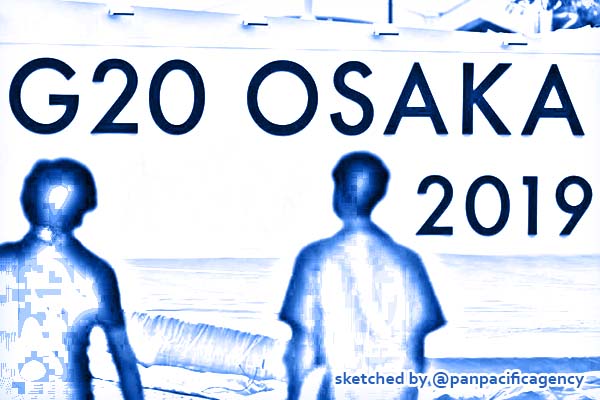[Analytics] Trade tensions loom large over G-20 summit in Osaka

About 7,000 journalists are registered to cover the summit, a senior Foreign Ministry official said, and the city of Osaka is on unprecedented security lockdown with extensive roadblocks. PHOTO: AFP. Sketched by the Pan Pacific Agency.
As leaders of the world’s 20 most eminent economies converge in Osaka for the two-day Group of 20 (G-20) summit, which starts tomorrow, Japanese Prime Minister Shinzo Abe will face the key task of shepherding the bloc towards an agreement, amid ongoing trade tensions. Walter Sim specially for The Straits Times.
This comes as all eyes are on the high-stakes bilateral meeting between United States President Donald Trump and Chinese President Xi Jinping on Saturday, where a failure to strike at least a truce in the trade war between their two countries could lead to more tit-for-tat tariffs and further cloud the global economic outlook.
Mr Abe, as G-20 chairman, will get to prove his summit diplomacy chops in a powwow that may yet be overshadowed by a host of geopolitical issues – from Brexit to the Hong Kong protests over a controversial extradition Bill, and from North Korean denuclearisation to the Iran nuclear threat, with Mr Trump having nearly green-lit a military strike against Teheran last week.
About 7,000 journalists are registered to cover the summit, a senior Foreign Ministry official said, and the city of Osaka is on unprecedented security lockdown with extensive roadblocks.
Some 32,000 police officers have been mobilised. Rubbish bins and lockers at train stations have been sealed off, while schools have been closed.
Mr Abe recently said that continued unity of the G-20 bloc, which was formed in 2008 during the global financial crisis, is paramount.
“We want to make it a meeting that focuses on where we can agree and cooperate, rather than highlight differences,” he said. “The global situation is severe. If the G-20 breaks apart, for example in areas like economy or security, it will be over.”
However, the stresses are building in the G-20, with a signature longstanding pledge against protectionism dropped at the last summit in Argentina six months ago due to US pressure.
Experts and government officials in Tokyo have tamped down expectations of any similarly strong statement against protectionism in the final communique, though the phrase “promotion of free trade” may make an appearance.
Keio University economist Fukunari Kimura said he expects the final document to adhere closely to the wording as agreed upon by trade ministers in Tsukuba earlier this month.
The ministerial statement said: “We strive to realise a free, fair, non-discriminatory, transparent, predictable and stable trade and investment environment, to keep our markets open.”
Dr Kimura, who is also chief economist at the Economic Research Institute for Asean and East Asia, added: “The challenge is not to have any country leave the table, and also to find ways to have all countries engaged and involved.”
Much attention will be paid to the bilateral meetings taking place on the sidelines of the G-20 summit. Singapore is one of eight non-G-20 countries invited to attend.
Mr Abe will have one-on-one talks with at least 17 leaders, including Mr Xi tonight and Mr Trump tomorrow morning, giving him the chance to potentially mediate in the trade imbroglio between the world’s two largest economies.
He is set to meet Russian President Vladimir Putin on Saturday, although any substantial agreement on joint economic cooperation on the four disputed islands north of Hokkaido is unlikely, in what would have been a major diplomatic win for Mr Abe ahead of an Upper House election on July 21.
One notable snub, however, was to South Korean President Moon Jae-in, as the two neighbours remain mired in a deepening spat over wartime labour that Japan intends to raise at an arbitration court. The Straits Times understands that Seoul had broached a meeting, but this was turned down by Tokyo as it felt a constructive or productive outcome was unlikely.
OTHER KEY ISSUES
Beyond trade, Japan has set the following issues as priorities for the two-day Group of 20 (G-20) summit, which starts tomorrow.
1. MARINE PLASTIC WASTE
Following Asean’s pledge last weekend to fight plastic waste in the seas, G-20 leaders will likewise seek to build a framework to promote sound waste management and devise action plans, while pledging support for developing economies.
Plastic litter causes US$13 billion (S$17.6 billion) in damage to marine ecosystems annually, and G-20 countries account for nearly half the plastic waste in the seas.
2. DATA GOVERNANCE RULES
Japan is set to launch the Osaka Track, a forum to promote rule-making in the digital economy and the concept of “data free flow with trust”. The G-20 bloc will also seek to address cross-border taxation issues in e-commerce.
3. WOMEN EMPOWERMENT
While progress on gender equality has been slow in Japan, especially in terms of women in management, Prime Minister Shinzo Abe wants to use the G-20 stage to promote participation and promotion of women in the workplace, and support for girls’ education in science, technology, engineering and mathematics.